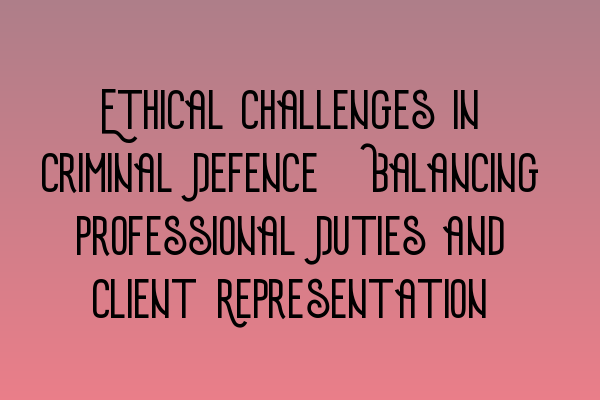Ethical Challenges in Criminal Defence: Balancing Professional Duties and Client Representation
Welcome to the blog post by SQE Criminal Law & Practice Law UK. In today’s discussion, we will explore the ethical challenges faced by criminal defence solicitors when balancing their professional duties and client representation. Criminal defence is a specialized area of law that brings unique challenges for legal practitioners. It requires skilful navigation of ethical responsibilities while zealously advocating for their clients’ rights.
One of the key ethical dilemmas faced by criminal defence solicitors is the tension between their obligations to the court and their duty to their clients. Solicitors have a duty to act in the best interests of their clients and provide them with strong representation. However, they must also uphold the integrity of the justice system and not participate in any unlawful or unethical conduct.
When defending a client, solicitors may encounter situations where they have knowledge of their client’s guilt but must still advocate for their innocence. This presents a significant ethical challenge as it requires the solicitor to balance their duty to the court and their professional obligations to their client. Navigating this delicate balance can be particularly challenging, but it is essential to uphold the principles of justice and fairness.
Another ethical challenge faced by criminal defence solicitors is the duty of confidentiality. Solicitors are bound by strict rules of client confidentiality, which means that they must keep any information disclosed by their clients confidential unless otherwise permitted or required by law. This duty of confidentiality ensures that clients can fully trust their solicitors and disclose all necessary information without fear.
All solicitors must also adhere to the Solicitors Regulation Authority (SRA) Code of Conduct, which outlines the professional and ethical standards expected of legal practitioners. These standards play a crucial role in maintaining the integrity of the legal profession and ensuring that solicitors act in the best interests of their clients.
Striking a Balance
Striking the right balance between professional duties and client representation is crucial for criminal defence solicitors. It requires a deep understanding of the law, ethical principles, and the needs of the client. Solicitors must diligently prepare their cases, ensuring that they have explored all relevant legal avenues and presented their clients’ interests effectively.
While zealously advocating for their clients, solicitors must also conduct themselves with integrity and avoid any conduct that may jeopardize the integrity of the justice system. They must remain mindful of their professional obligations, including their duty to the court, the duty of confidentiality, and maintaining client trust.
It is important for criminal defence solicitors to stay updated with ongoing legal developments and engage in continuous professional development to enhance their legal knowledge and skills. This will enable them to effectively navigate the ethical challenges of their practice while providing the best possible representation for their clients.
Conclusion
As criminal defence solicitors, the ethical challenges we face in balancing our professional duties and client representation are complex and demanding. However, by staying true to our ethical obligations, diligently preparing our cases, and staying updated with legal developments, we can effectively navigate these challenges and provide exceptional representation to our clients.
For more resources related to SQE preparation and exam dates, please check out the following articles:
- SQE 1 Practice Exam Questions
- SQE 1 Practice Mocks FLK1 FLK2
- SQE 2 Preparation Courses
- SQE 1 Preparation Courses
- SRA SQE Exam Dates
